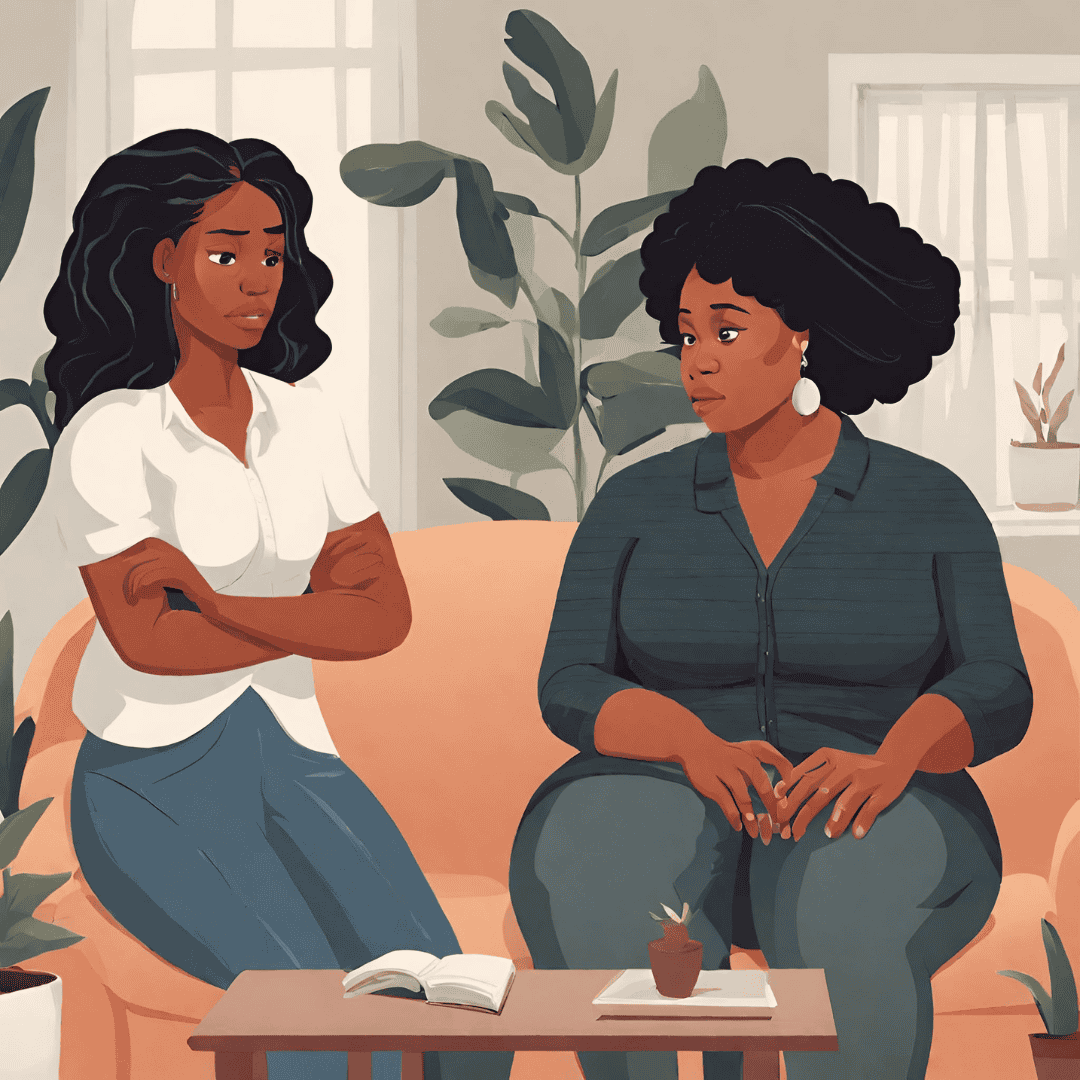
The Hidden Battle: Exploring Imposter Syndrome in Black Women
Disclaimer: This information is to be read for educational purposes. I am not a mental health professional or a psychologist specialising in imposter syndrome.

What is Imposter Syndrome
According to Psych Central, imposter syndrome is when you are doubting yourself and your skills because you feel inadequate and not confident in your capabilities. Psychologists Dr Imes and Dr Clance coined the term imposter syndrome in 1978 based on a study that involved mostly white women from middle to upper-class backgrounds.
These women held senior positions in companies and included medical and college students from different universities, and what they discovered was that these participants had self-doubt and felt inadequate and thought that they tricked people into thinking that they were capable of their roles.

What are the causes?
Family and Upbringing
Parents can put pressure on their children to achieve high grades especially if they are from an African household where education is highly important. While education is essential, placing a lot of pressure on children can affect mental health which isn’t always considered.
And this can manifest into anxiety and fear as a result of setting high standards. An example of this is when I failed two subjects which were sociology and English Language when I studied for my A-levels at Bury College.
On top of that, I remember going to college with my Mum and discussing the next steps with English teachers. I ended up dropping Sociology and keeping English because I preferred English Language.
As soon as I got home, I had a headache and I remember my Dad telling me to aim for high grades. I took that speech and started to put pressure on myself which manifested into becoming a perfectionist at university.
Personality
There are certain traits that some people have that make them a perfectionist. This could be linked towards people who identify themselves as introverts. This trait can lead to stress due to overworking and overpreparing content, which can lead to tiredness.

How does Self-Doubt relate to feeling like an imposter?
Self-doubt is when someone doubts themselves and their skills. It involves doubting yourself based on negative experiences, situations and different aspects of life.
Also, self-doubt is the main factor behind the feeling of imposter syndrome because you don’t have the confidence to carry out tasks that can help you progress to your next goal.
Statistics of Imposter Syndrome
A study in the Independent revealed that around 4,000 people have experienced this type of self-doubt. 53% of women have experienced imposter syndrome and 72% of women are more likely to have imposter experience at work.
In comparison, 63% of men are also at a higher risk of having imposter syndrome at work. Although this research shows women are more likely to experience imposter syndrome at work. Unfortunately, it doesn’t mention the percentage of black women who also have this form of self-doubt because there are reasons such as microaggressions and being underrepresented at work which can lead to feeling inadequate.
What’s it really like to have imposter syndrome?
The negative thoughts are influenced by an inner critic (it’s like having someone in your head telling you that you can’t do something, spreading doubt into your mind that leads to low confidence). Here are the reasons why imposter syndrome is detrimental:
- It can hinder your growth as an individual, as a content creator
- And this could even lead to past, negative experiences that have already happened that can affect this feeling of incompetence.
- Makes you feel frustrated even though you are aware of your skills and achievements a strong inner critic is reminding you why shouldn’t be doing these things.
- You will overthink things and think about the things that could go wrong.
What are limiting beliefs?

Some people who have imposter syndrome experience different emotions such as fear, guilt and frustration that can reinforce their limiting beliefs. According to the Happier Human blog, limiting beliefs is a “state of mind or thoughts that you believe are true. “
Here are some examples that I went through during my long hiatus of blogging:
- I’m not a good blogger because I don’t have experience creating content for businesses.
- My writing isn’t good enough or I don’t have any experience in writing so I am going to stop writing.
- I don’t look good on camera and have no idea what to say so I will not record myself.
- I don’t have enough of a large audience so how can I possibly continue blogging?
- My content isn’t good enough so maybe I should stop blogging altogether.
- I wrote 9 blog posts when I first started blogging and eventually, I started becoming demotivated and started to doubt myself. I stopped blogging and didn’t return until this year.
Limiting beliefs relates to imposter syndrome because it is a story based on an experience that keeps you in your comfort zone. This shows how powerful imposter syndrome can be and can get out of control if we don’t tackle it from the beginning.

The Effects of Imposter Syndrome
The consequences can manifest in traits such as perfectionism, procrastination on tasks, self-doubt and even anxiety.
Feeling like an imposter syndrome is not a mental illness but it can take a toll on you emotionally. Doubting yourself causes you to overthink things and you end up thinking about things that could go wrong instead of doing it.
On top of that, you end up feeling guilty because you are not doing what you are supposed to be doing and it becomes a cycle that is hard to break. And it will take different strategies to overcome it.
When in reality you realise that once you have completed the tasks that were worrying you, you realise that it wasn’t such a big deal.
Perfectionism
Another effect of imposter syndrome is perfectionism. Perfectionism can be detrimental because it doesn’t allow us to think about embracing failures and making errors. It is rooted in always trying to make your work look perfect.
As mentioned by Dr Orbe-Austin, author of Own Your Greatness and a psychologist perfectionism is related to self-doubt because you are always reaching for expectations that are not realistic, not realising that being perfect hurts your creativity, and it will leave you feeling stuck and not go any further.
There is nothing wrong with producing high-quality work, but when someone is a perfectionist it can be exhausting and it involves focusing your energy on setting unrealistic expectations. A perfectionist will aim for their best and when they don’t reach for the goals, they start taking it out on themselves.

Signs you may have imposter syndrome
An article by Teachable outlined signs that show a person may be experiencing imposter syndrome. Here are some of the common signs:
- Fear of not living up to people’s expectations
- Setting unrealistic expectations
- Feeling inadequate and don’t believe that you have the skills or experience to create content.
- Sabotaging your success as a result of self-doubt
- Perfectionism
- Low self-confidence
Types of imposters
According to Valerie Young, a renowned expert in imposter syndrome and the author of The Secrets Thoughts of Successful Women: Why Capable People Suffer from It and How to Thrive in Spite of It. In her research, she identified 5 types of imposters :
The Perfectionist
This person tends to want their work to be perfect, sets unrealistic goals and punishes themselves when they can’t meet their goals or have failed to meet one of the goals. Instead of acknowledging the hard work, they take it out on themselves.
The Soloist
According to Simply Psychology, soloists enjoy working independently and believe they can do things by themselves. They believe that asking for help is a sign of weakness and even though they know they can ask for help, they don’t want people to think that they can’t do things by themselves.
Superhero/heroine
As mentioned by the tilt, this person feels adequate when juggling multiple responsibilities and if they can’t manage various roles then they may start to feel like they are a failure because they are not keeping up with being the superperson and feel like they have tricked people into thinking they are the superhero or heroine.
Expert
This person feels adequate by how much and what they know and need to have the necessary skills and qualifications such as applying for jobs. If they don’t know enough about a topic they can start doubting themselves.
Natural genius
This person tends to learn things at a quicker speed and “they tend to put little effort into the work they are doing” and if it takes longer for them to learn or understand a topic, this can make them feel like a failure.
Final Thoughts
There are many ways to overcome imposter syndrome and this will be discussed in another article which looks at how these strategies can help black women who acknowledge their imposter syndrome and want to overcome it.
It starts with self-compassion, knowing your self-worth, and learning from your upbringing because we know that many things have contributed to our self-doubt that can come from upbringing.
It took me a long time to know that confidence is a powerful belief that can change your life significantly. I know that slowly the belief in myself will become second nature.
Thank you for reading my article I hope this will help black women who have imposter syndrome and recognise that everyone can doubt themselves, it becomes a problem when imposter syndrome affects your mental health.
If you enjoyed reading this article, don’t forget to comment and share. If you have any content ideas that can elevate and educate unapologetic black women, let me know in the comments.






